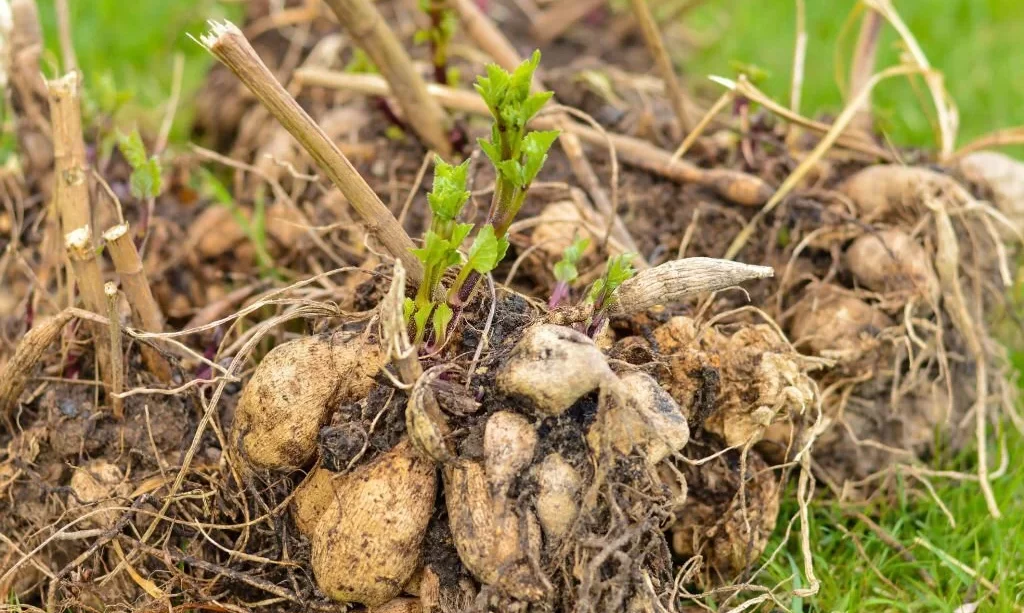Dahlias, with their dazzling array of colors and intricate petal shapes, are a favorite among gardeners. If you’re looking to expand your dahlia collection or revitalize existing plants, dividing dahlia tubers is a skill worth mastering. In this guide, we’ll take you through the process in simple steps, making it accessible even for novice gardeners. Let’s embark on this journey to multiply the beauty of your dahlia garden.
- QUALITY: Made in Japan with the finest stainless steel.
- EASY MEASUREMENT: Inch markings on the blade will ensure your plants and bulbs are planted at just the right depth.
- MULTI-USE: Both serrated and straight edge blades, and is a fantastic gardening, landscaping, and camping tool.
- DURABILITY: The blade is rust and scratch resistant, and stays razor sharp.
- ERGONOMIC: Blade Size: 7.25 inches; Handle Size: wood, 5.25 inches; Weight: 10 oz.
Choose the Right Time
Successful dahlia tuber division begins with timing. To ensure the best results, it’s crucial to pick the right moment for this task:
- The ideal time to divide dahlia tubers is in early spring, just before you plan to plant them or as soon as you spot new shoots emerging from the tubers.
- Spring division is advantageous because the tubers are still dormant, which makes the process less stressful for the plant and encourages robust new growth.
Now that you understand the importance of timing, let’s move on to the essential steps for dividing dahlia tubers and enhancing your garden with these magnificent blooms.
Gather Your Tools
Before you begin dividing dahlia tubers, ensure you have the necessary tools and materials at your disposal. Here’s what you’ll need:
- Garden Knife or Spade: You’ll require a sharp and clean garden knife or spade for cutting through the tubers.
- Pruning Shears: These will come in handy for trimming excess foliage.
- Container with Perlite and Peat Moss: Prepare a container filled with a mixture of perlite and peat moss. This will be used to store the divided tubers until planting.
- Labels: To avoid confusion, have labels ready to mark each tuber, especially if you are dividing multiple dahlia varieties.
Having these tools ready will make the division process smoother and more efficient.
Dig Up the Dahlia Clump
With your tools in hand, it’s time to dig up the dahlia clump from the ground. Follow these steps:
- Using your spade or garden fork, dig carefully around the perimeter of the dahlia clump. Be sure to dig far enough away from the tubers to avoid damaging them.
- Once you’ve loosened the soil around the clump, gently lift it from the ground. If the clump is large, you may need to enlist the help of a gardening buddy to ensure a smooth extraction.
By following these steps, you’ll safely unearth the dahlia clump, setting the stage for the tuber division process.
Shake Off Excess Soil
After successfully removing the dahlia clump from the ground, it’s essential to prepare the tubers for division. Here’s how to shake off excess soil:
- Hold the clump gently over your designated work area.
- Carefully shake the clump to remove loose soil without damaging the tubers.
- You can also use your fingers or a soft brush to gently remove any clinging soil.
The goal is to expose the tubers while preserving their health and integrity.
Divide the Tubers
Dividing dahlia tubers is the heart of this process. Follow these steps to divide them effectively:
- Examine the clump closely and identify the individual tubers. Each tuber should have at least one eye, which is a small bud or bump on the tuber where new growth will emerge.
- Using a sharp and clean garden knife or spade, carefully separate the tubers from each other. Ensure that each divided tuber has a portion of the main stem attached to it, along with a healthy eye.
- If there are any damaged or rotting tubers, discard them to prevent issues from spreading to the healthy ones.
By following these steps, you’ll successfully divide your dahlia tubers, ensuring that each one has the potential to grow into a beautiful dahlia plant.
Trim Excess Foliage
Before storing your divided dahlia tubers, it’s a good idea to trim any excess foliage. Here’s how to do it:
- Inspect each tuber and look for excessive or damaged foliage.
- Using pruning shears or sharp scissors, trim the foliage back, leaving a few inches of stem attached to the tuber.
- The goal is to reduce the size of the foliage while ensuring that some stem remains, which can be helpful when you plant the tubers later.
Trimming excess foliage not only conserves space but also prevents the tubers from expending unnecessary energy on foliage growth during storage.
Label and Store
Properly labeling and storing your divided dahlia tubers is crucial for keeping track of varieties and ensuring their health during dormancy. Here’s what to do:
- Label each divided tuber with the variety name if you have multiple types. This will help you identify them when it’s time to plant.
- Place the labeled tubers in your container filled with perlite and peat moss. Make sure the tubers are not touching each other; they should have some space to avoid any potential moisture buildup.
- Store the container in a cool, dry place with good ventilation. Ideal storage temperatures are between 40-50°F (4-10°C).
By labeling and storing your divided dahlia tubers correctly, you’ll be well-prepared to plant them when the growing season arrives, ensuring a bountiful display of these magnificent flowers in your garden.
Plant the Divided Tubers
Once the danger of frost has passed and the soil has warmed up, it’s time to plant your carefully divided dahlia tubers. Here’s how to do it:
- Choose a sunny spot in your garden with well-draining soil.
- Dig holes that are about 4-6 inches deep and spaced approximately 18 inches apart.
- Plant each tuber with the eye (the small bud or bump where new growth will emerge) facing up. Place them in the holes and cover them with soil.
- Water the newly planted tubers thoroughly to help settle the soil.
With proper planting, your dahlia tubers will soon sprout, and you can look forward to a dazzling display of colorful blooms in the coming months.
Conclusion
Dividing dahlia tubers is a rewarding and straightforward process that allows you to multiply your dahlia plants and refresh older clumps. By choosing the right time, gathering the necessary tools, carefully digging up the clump, shaking off excess soil, dividing the tubers, trimming excess foliage, labeling and storing them correctly, and finally planting them in your garden, you can ensure the health and vitality of your dahlia collection.
As you follow these steps, you’ll discover the joy of nurturing these stunning flowers and watching them flourish season after season in your garden. With a little patience and care, your divided dahlia tubers will reward you with a vibrant and colorful display that brightens your outdoor space.





